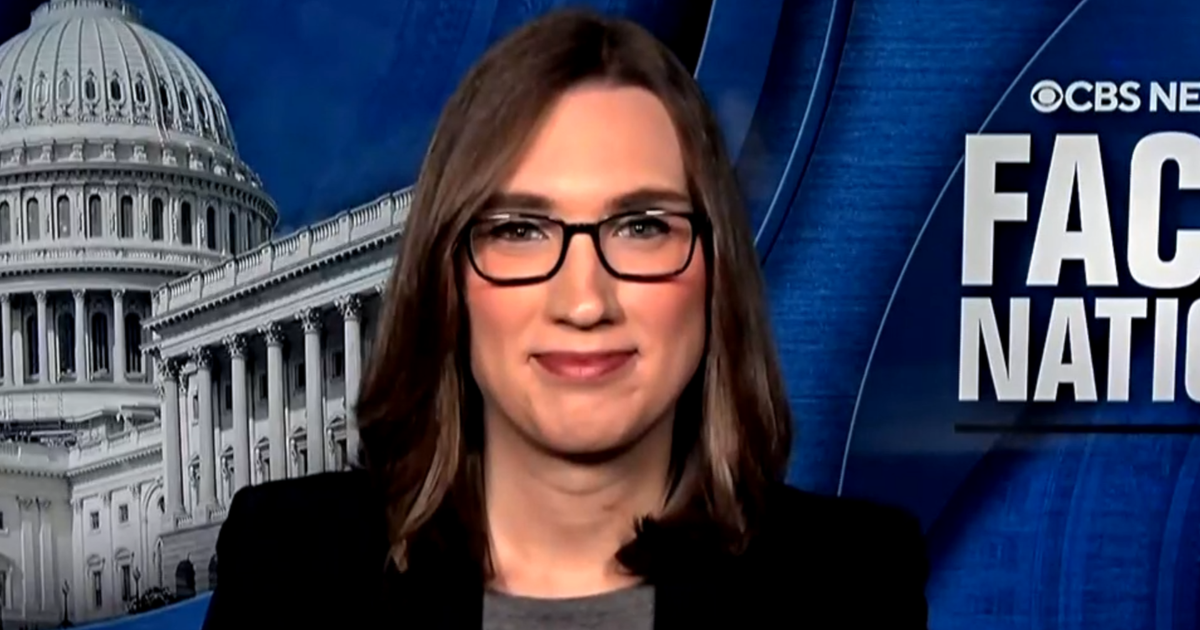CBS News
6 gold investments that could pay off with inflation rising

Getty Images
Inflation has been a persistent thorn in the side of the U.S. economy over the past few years. And, while rate hikes made by the Federal Reserve over the last couple of years have led inflation to drop from its peak of 9.1%, there’s still some work to do. According to the latest inflation report, released this week, the inflation rate is climbing again, climbing to 3.5% in March — up from 3.2% the month prior.
This ongoing inflationary pressure is causing concerns for many Americans, who are seeing their purchasing power erode and their savings diminish in value. It’s also negatively impacting investors’ portfolios, leading many investors to turn to gold as a potential hedge against inflation.
One major benefit of gold investing is that the precious metal is considered a safe-haven asset, one that can maintain its value even as paper currencies lose their purchasing power. So, it can make a lot of sense to add gold to your investment mix right now. But there are numerous gold investment options to choose from, so which ones could pay off in today’s inflationary environment?
Compare your top gold investing options online today.
6 gold investments that could pay off with inflation rising
If you’re looking to add some gold to your portfolio to combat rising inflation, here are a few gold investment options worth considering.
Physical gold bars and coins
The most straightforward way to invest in gold is to own physical gold bars or coins. Physical gold can be an effective inflation hedge because, unlike paper currency, the intrinsic value of gold is not eroded by inflationary pressures.
When inflation is high, the price of gold tends to rise, helping to preserve the real purchasing power of your assets. And, physical gold also provides a tangible store of wealth that you can hold in your possession rather than relying on a financial institution.
The main drawbacks are the extra storage and security costs that come with it, as well as the transaction fees involved in buying and selling physical gold. But for investors who want direct exposure to the gold market, physical ownership can be a wise choice in an inflationary environment.
Learn more about the benefits of gold investing now.
Gold ETFs and mutual funds
Investing in gold exchange-traded funds (ETFs) or gold mutual funds is a more convenient and liquid way to get exposure to the gold market. These funds hold physical gold or gold futures contracts, allowing you to benefit from rising gold prices without the hassle of securing and storing the metal yourself.
Gold ETFs and gold mutual funds can be a good option for investors who want the inflation-hedging properties of gold but prefer the flexibility and lower costs of a financial product over owning the physical asset. The funds provide instant access to the gold market, with the ability to buy and sell shares on an exchange.
Gold mining stocks
When inflation is high, gold stocks can be an attractive investment to consider. As the price of gold rises, the profitability of gold miners often increases in tandem. This is because the costs of mining operations, such as labor and equipment, tend to be fixed in the short term, allowing miners to capture more of the upside from higher gold prices.
Investing in individual gold mining stocks can provide leveraged exposure to the gold market. And, gold miners’ profits and share prices may rise more sharply than the underlying gold spot price, potentially generating outsized returns for investors. However, gold mining stocks also carry additional risks beyond just the gold price, such as operational challenges, management decisions and regulatory factors. So careful stock selection and portfolio diversification are important if you take this route.
Gold futures and options
For more experienced investors, trading gold futures and options can be a way to potentially profit from rising gold prices during inflationary periods. Futures and options provide exposure to gold with higher leverage than buying physical gold or gold funds.
These derivative instruments allow you to speculate on the future price movement of gold without taking physical possession of it. For example, futures contracts let you lock in a gold price for a future date, while options allow you to (but do not obligate you to) buy or sell gold at a predetermined price.
The upside to these gold investing options is the potential ability to magnify gains from gold’s price appreciation. But the downside is that futures and options also carry a greater risk of losses, especially for investors who don’t fully understand the complexities of these financial products. So, proper risk management is crucial.
Gold IRAs
Holding gold as part of your retirement savings in a gold individual retirement account (IRA) can be a prudent inflation-hedging strategy that pays off over time. A gold IRA allows you to own physical gold, gold ETFs or other approved precious metals within a tax-advantaged individual retirement account.
The key benefit of a gold IRA is that it provides tax-deferred or tax-free growth on your gold investments, depending on whether it’s a traditional or Roth IRA. This can maximize the long-term, wealth-preserving power of gold in your retirement portfolio. The tradeoff is the additional setup and maintenance costs associated with a gold IRA. It’s also not prudent to tap into the gold assets that are held in a gold IRA before retirement.
Collectible gold coins
For those interested in a more specialized gold investment, rare or limited-edition gold coins can be an option worth considering. The value of these coins comes not just from their gold content but also their scarcity and condition. And, in an inflationary environment, demand for scarce collectible gold items may increase, potentially driving up the prices.
However, the collectible coin market requires more specialized knowledge to navigate. Investors need to authenticate the coins and buy from reputable dealers to ensure they are getting fair value. Collectible gold coin buyers are limited, so it’s also a less liquid market compared to standard gold bullion or gold funds. In turn, this strategy is best suited for investors willing to take on additional complexity and risk.
The bottom line
Ultimately, the best gold investment strategy for you will depend on your risk tolerance, investment horizon and overall financial goals. But as inflation continues to be a concern, adding some gold exposure to your portfolio could be a smart move to help protect your purchasing power and benefit from the potential inflation-driven price growth of gold.
CBS News
Israeli strike kills Lebanese soldier as Hezbollah fires at least 185 rockets at Israel

Hezbollah fired at least 185 rockets and other projectiles into Israel on Sunday, wounding seven people in the militant group’s heaviest barrage in several days, in response to deadly Israeli strikes in Beirut while negotiators pressed on with cease-fire efforts to halt the war.
Meanwhile, an Israeli strike on a Lebanese army center killed one soldier and wounded 18 others on the southwestern coastal road between Tyre and Naqoura, Lebanon’s military said. Israel’s military expressed regret and said the strike occurred in an area of combat against Hezbollah, adding that its operations are directed solely against the militants. The strike was under review.
Hussein Malla / AP
Israeli strikes have killed over 40 Lebanese troops since the start of the war between Israel and Hezbollah, even as Lebanon’s military has largely kept to the sidelines.
Lebanon’s caretaker prime minister, Najib Mikati, condemned it as an assault on U.S.-led cease-fire efforts, calling it a “direct, bloody message rejecting all efforts and ongoing contacts” to end the war.
“(Israel is) again writing in Lebanese blood a brazen rejection of the solution that is being discussed,” a statement from his office read.
The strike occurred in southwestern Lebanon on the coastal road between Tyre and Naqoura, where there has been heavy fighting between Israel and Hezbollah.
Hezbollah began firing rockets, missiles and drones into Israel after Hamas’ Oct. 7, 2023, attack out of the Gaza Strip ignited the war there. Hezbollah has portrayed the attacks as an act of solidarity with the Palestinians and Hamas. Iran supports both armed groups.
Israel has launched retaliatory airstrikes since the rocket fire began, and in September the low-level conflict erupted into all-out war, as Israel launched waves of airstrikes across large parts of Lebanon and killed Hezbollah’s top leader, Hassan Nasrallah, and several of his top commanders.
Hezbollah fired a total of around 160 rockets and other projectiles into Israel on Sunday, some of which were intercepted, the Israeli military said.
Oded Balilty / AP
Israel’s Magen David Adom rescue service said it was treating two people in the central city of Petah Tikva, a 23-year-old man who was lightly wounded by a blast and a 70-year-old woman suffering from smoke inhalation from a car that caught fire. The first responders said they treated three other people in northern Israel, closer to the border, including a 60-year-old man in serious condition.
It was unclear whether the injuries and damage were caused by the rockets or interceptors.
Israeli airstrikes early Saturday pounded central Beirut, killing at least 20 people and wounding 66, according to Lebanon’s Health Ministry.
Israeli attacks have killed more than 3,500 people in Lebanon, according to Lebanon’s Health Ministry. The fighting has displaced about 1.2 million people, or a quarter of Lebanon’s population.
On the Israeli side, about 90 soldiers and nearly 50 civilians have been killed by bombardments in northern Israel and in battle following Israel’s ground invasion in early October. Around 60,000 Israelis have been displaced from the country’s north.
The Biden administration has spent months trying to broker a cease-fire, and U.S. envoy Amos Hochstein was back in the region last week.
The European Union’s top diplomat called for more pressure on both Israel and Hezbollah to reach a deal, saying one was “pending with a final agreement from the Israeli government.”
Josep Borrell spoke Sunday after meeting with Mikati and Lebanese Parliament Speaker Nabih Berri, a Hezbollah ally who has been mediating with the group.
Borrell said the EU is ready to allocate 200 million euros ($208m) to assist the Lebanese military, which would deploy additional forces to the south.
The emerging agreement would pave the way for the withdrawal of Hezbollah militants and Israeli troops from southern Lebanon below the Litani River in accordance with the U.N. Security Council resolution that ended the 2006 war. Lebanese troops would patrol the area, with the presence of U.N. peacekeepers.
Lebanon’s army reflects the religious diversity of the country and is respected as a national institution, but it does not have the military capability to impose its will on Hezbollah or resist Israel’s invasion.
CBS News
Sen. Rand Paul says he “will not support” use of military in Trump’s planned deportations

Watch CBS News
Be the first to know
Get browser notifications for breaking news, live events, and exclusive reporting.
CBS News
Transcript: Rep.-elect Sarah McBride on “Face the Nation with Margaret Brennan,” Nov. 24, 2024

The following is a transcript of an interview with Rep.-elect Sarah McBride, Democrat of Delaware, on “Face the Nation with Margaret Brennan” that aired on Nov. 24, 2024.
MARGARET BRENNAN: The 2024 election was historic for several reasons. Among them, the first openly transgender person was elected to the United States Congress. She joins us now from the state she will be representing, Delaware. Democratic Representative-elect Sarah McBride. Welcome to Face the Nation.
REP.-ELECT SARAH MCBRIDE: Thank you for having me, Margaret.
MARGARET BRENNAN: You know, it’s interesting, given how polarized, how angry and divided this country is that people choose to serve and to run. You told my colleague Scott MacFarlane that it was your personal experience as a caregiver for your husband during his bout with terminal cancer that inspired you to run. Do you expect that health care policy will be the focus of your work here?
: Well, I certainly am glad to be back here in Delaware after two weeks of orientation and to have the privilege of serving this state that I love in Congress. I ran to bring down costs facing workers, retirees and their families. That means bringing down the cost of health care, but also housing and child care and everyday expenses like gas and groceries. I did run for office after my experience as a caregiver to my husband, Andy, during his battle with cancer. And throughout that experience, while Andy ultimately lost his life, we both knew how lucky we were. We knew how lucky Andy was to have health insurance that would allow him to get care that would hopefully save his life. And we both knew how lucky we were to have flexibility with our employers. That allowed Andy to focus on the full time job of getting care, and me to focus on the full time job of being there by his side to care for him, to love him, to marry him, and to walk him to his passing. And I ran for office because I do not believe that in the wealthiest, most developed nation on earth, that that time and that ability to get care should be a matter of luck. I believe it should be the law of the land. And it’s why during my time in the Delaware General Assembly, I passed paid family and medical leave and secured the largest investment in our state’s Medicaid program. And I want to do that work in Congress on health care, but also on housing and child care.
MARGARET BRENNAN: Paid leave is something that Mr. Trump has paid lip service to, we’ll see in the new Congress if it comes up. We see in our CBS polling that 86% of voters feel congressional Democrats should find common ground with Mr. Trump and Republicans. Do you feel you can?
: Well, I said throughout this campaign that I will work with anyone who’s willing to work with me to help Delawareans, to lower costs facing my constituents. There are opportunities for us to find common ground. But it’s also clear that this administration, as it begins to fill its appointments with Project 2025 authors, that a lot of the policies that this president will pursue will likely hurt my constituents and raise prices. And so where I need to fight back, I will. But where I can find common ground, I will certainly seek it. That’s what I’ve done during my time in the General Assembly, where nearly every bill I passed passed with bipartisan support.
MARGARET BRENNAN: As you mentioned, you were here for orientation. Speaker of the House Mike Johnson was asked about you coming to work and some objections by a female South Carolina Republican representative regarding what bathroom you’d be able to use. Here’s what the speaker said.
SPEAKER MIKE JOHNSON (ON TAPE): A man is a man, and a woman is a woman, and a man cannot become a woman. That said, I also believe- that’s what Scripture teaches, what I just said. But I also believe that we treat everybody with dignity.
MARGARET BRENNAN: Do you believe that you are being treated with dignity by your colleagues?
: I didn’t run for the United States House of Representatives to talk about what bathroom I use. I didn’t run to talk about myself. I ran to deliver for Delawareans. And while Republicans in Congress seem focused on bathrooms and trans people, and specifically me, I’m focused on rolling up my sleeves, diving into the details, setting up my office, and beginning the hard work of delivering for Delawareans on the issues that I know keep them up at night. And I look forward to working with any colleague who’s ready to work and ready to be serious about the issues that matter because at the end of the day, how I’m being treated does not matter. What matters is how the American people are being treated and whether we’re actually focused on the issues that matter to them.
MARGARET BRENNAN: Well, some of your fellow congressional Democrats, including Tom Suozzi and Seth Moulton, have also recently spoken about their feelings, looking back at the last election, and said Democrats should be more open about saying whether they object to transgender athletes playing in girls sports. Those were the specific examples they brought up. How would you respond to your soon to be Democratic colleagues on those? Do you understand why some parents, for example, feel uncomfortable or frustrated?
: Look, I think this country is still entering into a conversation about who trans people are, the full diversity of the community. And I’ve had conversations with colleagues in the Democratic caucus already that- that span diversity of thought about how the party should engage on a whole host of issues. But I think we are all united that every single American deserves equal rights. I think we are all united that attempts to attack a vulnerable community are not only mean spirited, but really an attempt to misdirect. Because every single time we hear the incoming administration or Republicans in Congress talk about any vulnerable group in this country, we have to be clear that it is an attempt to distract. It is an attempt to distract from what they are actually doing. Every single time, every single time we hear them say the word trans, look what they’re doing with their right hand. Look at what they’re doing to pick the pocket of American workers, to fleece seniors by privatizing Social Security and Medicare. Look what they’re doing undermining workers. And here’s also what we have to be clear about, because I think the last week has been a prime example of this. Every bit of time and energy that is used to divert the attention of federal government to go after trans people is time and energy that is not focused on addressing the cost of living for our constituents. And we have to be clear that there is a real cost for the American worker every time they focus on this.
MARGARET BRENNAN: All right. Congresswoman elect, I’m sure we’ll be seeing you here in Washington. We’ll be right back.




